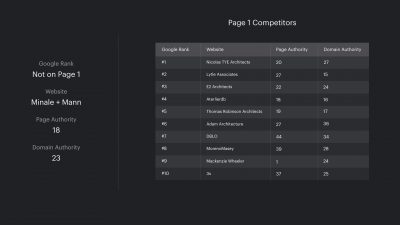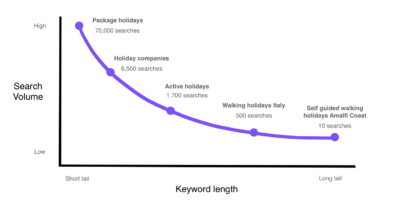Establishing an effective organic marketing channel can drive disproportionate return on the time and money invested. Not only this, but unlike most other marketing channels such as networking, social and paid, the benefits can continue long after investment stops.
Therefore, the impact of securing organic keyword rankings can be huge for small and medium sized businesses. It boosts discoverability and creates aligned new leads, sales and visitors for the business with minimal ongoing effort. However, with large businesses dominating the search engines in their respective industries, SME’s are having to be increasingly strategic to increase their search engine visibility and reap the benefits.
Can SMEs rank in search engines?
There is a huge opportunity for SMEs to secure high value search engine rankings. The key to successfully improving search engine rankings is to be realistic and strategic. If you’re a small business, even if you’ve been going a long time, it’s unlikely that you’ll be able to directly compete with organisations like Amazon, BBC News and the equivalent industry-specific titans. The trick is to find and enter keyword battles that you can statistically win. In many cases, this will mean targeting smaller keywords with modest search volumes. This approach will enable you to improve your aggregate rankings and meaningfully move the needle on your visibility.
Why Google favours large businesses
Have you ever felt like the rules of SEO don’t apply to large businesses? We see some of the biggest players making fundamental SEO mistakes on their websites and yet they still rank #1 in Google. To understand why this happens, we can take a look at how Google ranks websites.
Google’s goal for organic search is to provide the best and most relevant results for a given search term. Doing this well is why they remain the most used search engine.
With this in mind, 3 main factors play into the algorithm:
- Trust
- Specificity
- Contextual Trust
The level of Trust that a business has is a good indicator of how competitive they can be in search engines. Large businesses typically score very highly on the metrics that indicate Trust, including domain authority, strong backlink profiles, time in business and so on. Conversely, SME’s typically have lower trust metrics, which is why small businesses can find it difficult to rank. As a result, large business may rank without trying, whereas small businesses need to put in the hours to achieve the same results.
Watch the video below to find out more about how Google ranks websites and how businesses can set realistic keyword targets.
How can SMEs leverage Google’s algorithm?
The Trust part of search engine algorithms is grown over time (or with extensive digital PR campaigns), therefore businesses looking to increase their rankings in the immediate term should select keywords based on their existing Trust metrics. With this in mind, SMEs should focus on the parts of the algorithm that are within their control: Specificity and Contextual Trust.
Specificity and Contextual Trust are within the control of every website manager and can be influenced very quickly. SMEs can build rankings by benchmarking their Trust levels, selecting keyword targets that they can compete for based on those metrics, then investing their resources into signalling Contextual Trust and Specificity to search engines for those keywords. In practical terms, this usually means implementing high quality best practice code, optimising load speeds and Core Web Vitals, creating engaging on-page copy, and optimising on-page factors such as H tags, Meta Descriptions, URLs and Page Titles.
The video below shows how a small architecture practice in London leveraged their domain authority to start ranking for high value keywords. You can read the full case study here.
How can SMEs grow their SEO rankings?
Our SEO team has curated our top tips for SMEs to start building their keyword rankings.
1. Work with your Trust metrics
As discussed, the Trust metrics of a website will dictate which keywords you can successfully rank for in search engines. We recommend measuring the Trust metrics for your own website, your key competitors, and the leaders in your industry to understand your comparative position.
When undertaking keyword research, we’re looking to find keywords where businesses with similar or lower Trust metrics are already ranking. Read more about how to choose keywords for SEO.
How to measure Trust
We use Domain Authority (DA) scores from Moz as a high level benchmark for Trust. Domain Authority is reported on a scale of 1-100 where 100 indicates a high level of Trust and 1 indicates a low level of Trust and likely a brand new business or website. Anybody can check the domain authority of their website using Moz’s free domain analysis tool. Learn how to check your domain authority.
The example below shows the Trust metrics for a small architecture studio in London called Minale + Mann. It also shows the Trust metrics for the businesses already ranking on Page 1 of Google for the keyword ‘commercial architects’. As you can see, Minale + Mann’s domain metrics are comparable to those already ranking. By focusing on their ranking signals for Specificity and Contextual Trust, we were able to move Minale + Mann into position #1 for this search term within a couple of months.

Things to note:
- Remember that increasing domain authority will be easier when the starting domain authority is low compared to when the start point is high. The gap between DA 20 and DA 30 is smaller than the gap between DA 50 and DA 60.
- The same domain authority score can indicate different levels of competitiveness in different markets. Your level of competitiveness will be determined by how your score compares to the other businesses ranking in search engines.
2. Use long tail keywords
Long tail keywords are search terms that are more specific to your business, service offering and location. They often contain more words and as the specificity of the keywords increases, search volumes typically decrease.
When selecting keywords, the goal is to find relevant search terms that demonstrate intent and have the highest search volumes that you can compete for in search engines. The more specific the keyword is to the business, the higher the chance of converting the user once on the website. We want to strike a good balance between the specificity of the keywords and the search volume.
Large businesses are able to compete for broader short tail keywords, whereas SMEs will drive the best outcomes by targeting longer tail keywords that are specific to their service offering.

3. Look at successful websites with similar metrics
Finding websites that rank well and have an equivalent or lower domain authority than your website is a great place to find keywords that you could also achieve. Tools like SEMRush and Moz both provide tools that create lists of keywords that websites are ranking for in search engines.
4. Create a strategy
If you are serious about growing rankings, an SEO strategy is needed to ensure that all the elements that contribute to keyword positions are working together on your website to drive rankings.
A successful strategy will analyse hundreds of keywords and select ones that you can statistically achieve for based on your Trust metrics. It will recommend a website structure that dovetails with the keyword targets, groups keywords together for optimisation, and prevents keyword cannibalisation (when you confuse search engines by having too much content targeting the same keywords).
Strategies require experience and access to professional tools to put together well so we recommend consulting an SEO specialist for this piece of work.
5. Optimise the Specificity of your website
To tick Google’s boxes on the Contextual Trust and Specificity parts of the algorithm, the next step is to optimise the website in line with the strategy and selected keyword targets. This will include:
- Writing relevant and high quality copy
- Optimising H tags throughout the site
- Creating landing pages for specific copy
- Internal linking
- Optimising URLs
- Optimising Meta Descriptions and Page Titles
And much more to gain a high level of specificity on the website.
So can small businesses websites compete with big players in SEO?
There is a ginormous opportunity for small to medium sized businesses to increase their SEO and open up an organic marketing channel. Our key takeaways are to be strategic, be realistic, and lean in to the ranking factors that you can control.
If you would like some advice on SEO rankings and SEO strategy, you can book a complimentary consultation by emailing us at [email protected] or calling 0203 0111 641.
Other content you may like:
How to choose keywords for your SEO strategy
What Makes a Winner? The Strategy Behind Our Cross Border Campaign Win at the eCommerce Awards
How to Implement Hreflang Tags: Global SEO Optimisation
How to Change Your Domain URL Without Losing SEO

